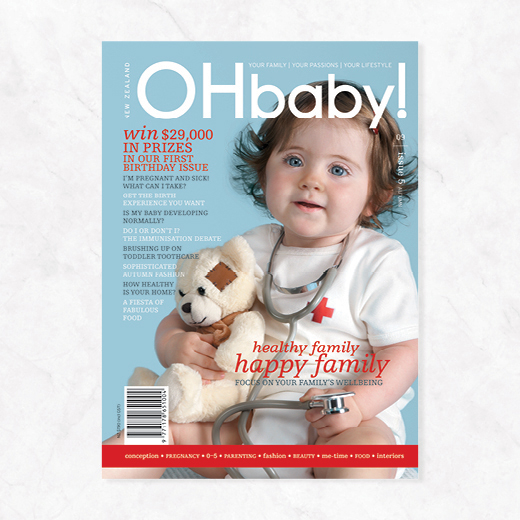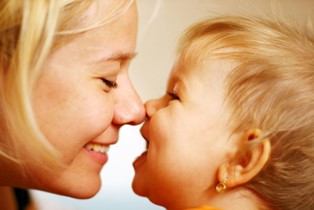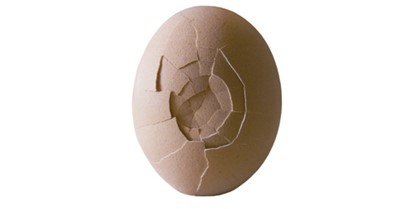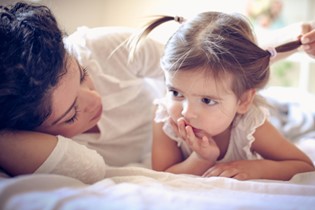Typical Child Development
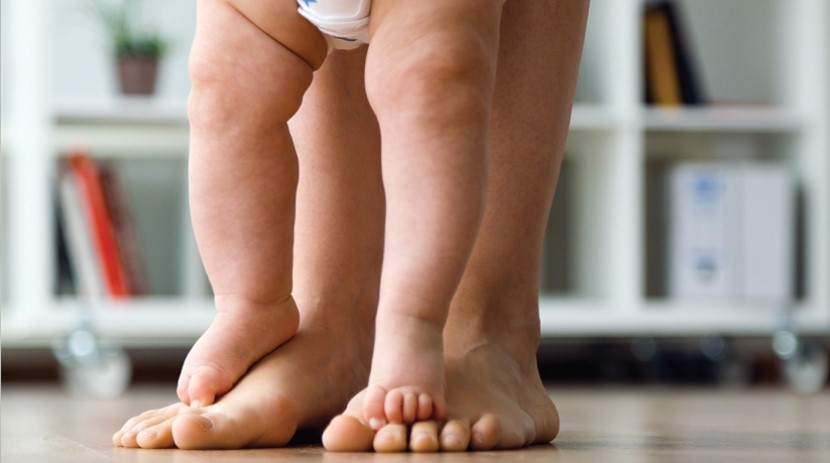
Most parents, at one time or another, worry that their child isn't developing 'normally'. But rather than focusing so much on what our babies are not doing, we should be celebrating what they are capable of, explains Dr Melanie Woodfield.
Usually, parents only become interested in the finer points of their child's development when something doesn't happen as it should - that awful niggling fear that your child is not holding her head up as long as other babies, or not rolling over yet. Typically, when we think of "development" in babies, we think of motor development - the physical things that baby can (or can't!) do. In fact, child development encompasses a number of different aspects, including motor (physical) development, social and emotional development, cognitive (intellectual) development, and language development.
These aspects of development are intertwined and generally occur alongside each other. For example, when a baby is lying on his back reaching out for rings dangling from a playgym, he is developing and refining motor skills. at the same time, his intellect is stimulated by exploring sounds, textures, and movement (if we imagine what a baby is thinking, it might be along the lines of, "Ooooh, that's soft, and that's round… Come on, hard round thing, move over by the soft squishy thing!"). Now don't bother flicking to the next page in search of the good ol' table showing which skills babies ought to have developed by which age, because you won't find it! Most professionals, including psychologists, resist issuing absolutes about when children ought to have achieved certain milestones. They also tend to shy away from using terms like "normal development", particularly when it comes to babies and toddlers, because there is such variation.
While we typically follow a similar pattern (crawling usually happens before walking, which happens before running…), children vary hugely in when they actually achieve each step and how long they stay at that step. Instead, it's often more helpful to think of normal ranges (i.e. typically babies take their first independent steps somewhere between 9 and 15 months of age). It's important to be aware of the common trap we parents fall into of unconsciously (or consciously), comparing our child's development to that of other children. Instead of "What is my baby doing compared to other babies?", a more helpful question would be "Is my baby doing more/different things to what he was doing a few weeks ago?" If so, just enjoy your baby. If not, keep an eye on things, but still enjoy your baby.
When it comes to child development, there are many, many theorists with many, many theories. Instead of sharing the theory, I thought I'd provide you with some interesting tidbits broadly related to child development.
Language and social development
Some of the most useful information about "normal" development comes from those situations where development has been "abnormal" for some reason. While it would be unthinkable to put children in cruel situations deliberately simply to study them, we can make use of situations where this has happened by chance. An interesting example is that of Victor, the "wild boy of Aveyron". While many argue that this, and other "wild child" stories, are fictitious, the story goes that Victor apparently lived his entire childhood alone in the forest before being found wandering the woods in France in 1797. He was captured, but soon escaped. He was then captured again and kept in the care of a local woman for a short time before he escaped once more. However, in January 1800, he emerged from the forest on his own. His age was unknown but citizens of the village estimated that he was about twelve years old. His lack of speech, his food preferences, and the numerous scars on his body indicated that he had been in the wild for most of his life.
Itard, a young medical student, took on Victor as his own. He wanted to be the first person to fully civilise a wild child and attempted to teach Victor to speak. Though initially successful - Victor showed significant progress in understanding language and reading simple words - he eventually slowed down to the point that Itard abandoned the experiment. The only words that Victor ever actually learned to speak were lait ("milk") and Oh Dieu ("Oh God"). The Wild boy of Aveyron died in Paris in 1828.
Within the realms of child development, another case that is often mentioned is that of Genie, a modern-day "wild child". When Genie and her mother, who was almost blind, walked into a welfare office in Los Angeles in November 1970, it spelled the end of 13 years of horrific abuse. Her father, reportedly a violent and unpredictable man, had "protected" Genie from the world by strapping her to a commode chair in a dark bedroom of an almost silent house. Genie's mother and brother were forbidden from talking to her. Food was thrust to her with no communication. When her mother finally left her father and sought help, Genie was small and withered, with a shuffling walk; she showed no perception of heat and cold, and she could barely speak.
Scientists pounced on Genie as an incredibly rare opportunity to learn more about what happens when a child's environment is devoid of social contact and the opportunity to learn language. Language is generally learned anecdotally - children hear others talking to them, and each other, and have an innate ability to pick it up, without formal instruction in how to do so. Prior to Genie's case, many believed that a "critical period" existed for language development - if a child has not developed language by about age 12, they are unlikely to in the future. Ever wondered why it's much harder for an adult to learn a new language than a child?
Several journal articles, chapters, and entire books, have been written on the "taming" of Genie, and the attempts to teach her to speak. In a nutshell, Genie did learn to speak in two- to three-word sentences, but was described as speaking like a muddled telegram in that her grammar was poor, and she never learned to ask questions. Genie's case indicated that it is possible for children to develop language beyond the critical period, but language develops in a different way in these situations. Socially, Genie continues to struggle, and behaves as though she has an intellectual disability, although there is no evidence that she was born with a disability. Genie is still alive today, and living in the USA.
Motor and sensory development
Many years ago, scientists used to believe that a child's brain was fully formed at birth, and that our genes dictated everything about who we would become - our personality, intelligence, and abilities were pre-set and could not be altered.
Things have changed dramatically. These days, we know, thanks to the incredible work of Bruce Perry and others (see www.brainwave.org.nz for more information and resources) that a baby's brain is only partially formed at birth, and the majority of the remainder forms in the first three years of life. We are born with the bits of brain material we need, but our early experiences are essential for our brain cells to form connections and pathways. According to Bruce Perry, our brains develop in a "use-dependent" fashion - those pathways that are used most often become stronger and stronger, and those that aren't used are essentially lost. Our experiences in our early years, be they largely positive or largely negative, have a direct impact on how our brain develops. According to the Brainwave Trust, consistent nurturing and positive rich experiences result in flexible, responsible, empathetic and intelligent members of society. Neglect, chaotic environments, violence, and abuse can result in aggressive, remorseless and intellectually starved members of society. You can see why the Brainwave Trust is trying to spread the word!
When it comes to appropriate activities to do with your baby to encourage motor development, it sounds like common sense, but it's important to be guided by your baby. If your wee one is showing no signs of head/neck control, pop the jumper and plastic seat back in the cupboard for a few more weeks. Babies have successfully been developing into adults for thousands of years without the aid of the latest whizz-bang cot mobile. Trust your instincts. Get down on the floor and enjoy your baby. Follow their lead and comment on things that they do. Echo their sounds and repeat them back. If baby touches something, comment on it: "Ooooh, you're touching the big green frog. Is that nice?", or "Here's a rattle, would you like it?" You may feel ridiculous, but your baby will think you're the bee's knees.
Cognitive/intellectual development
Babies are born with some pretty exceptional skills, and are already rather "intelligent". Before birth, babies can respond to touch and recognise their mother's voice. At birth, infants can distinguish pleasant and unpleasant smells, and sweet, sour, and salty tastes. By three months, their depth perception and peripheral vision is relatively well developed, and they are continuing to be fascinated with faces. As they grow, they will become more interested in their surroundings.
At this age (some would argue at any age) there is no need to buy expensive toys, DVDs or CDs to keep baby amused or to ensure their cognitive development. One of our articles ("Tune in or turn off?" by Pauline Ogilvy) explored the usefulness (or otherwise) of "educational" TV and DVDs for children, and the impact on children's development. It is generally thought that the younger the baby, the less they need formal education, and the more they need simple human-to-human interaction. You're probably aware that in the first few weeks of life, babies have limited, black-and-white blurry vision. Popping baby in front of the latest educational DVD is likely to be a waste of time at this age. In early weeks, infants can only focus on objects about 30cm from their face (about the distance from their eyes to your eyes if you're cradling them in your arms). They show a particular interest in dark-light contrasts (have you ever wondered why women's areolas and nipples darken during pregnancy?). In order to assist their brain development, we just need to do what comes naturally for most mums - look at baby, smile, talk gently and hold them close. If you're keen on props, make use of simple things - for example, scraps of knotted soft fabric for sucking on, and using your hands to massage, tickle, and stroke baby.
There are also some simple games you can play to pass the time. Young babies haven't yet developed a concept known as object permanence - the idea that an object is still present, even if they can't see it. This is why games such as peekaboo are hilarious for most babies - they truly believe that you have "disappeared" when you hold your hands over your face and they can no longer see you. Couple your "reveal" with a "Boo!", and chances are you'll have a fascinated (or frightened!) chortling baby.
Social/emotional development
A concept that has been around for centuries, but which has been given more attention in the past few decades is that of the attachment relationship between one or two caring adults and a baby. In a nutshell, this is the essential bond that forms between mum, dad, and baby. Attachment is hugely important, but thankfully, very simple to achieve.
A baby needs to know that he is safe and loved from the moment he enters the world. This is achieved through close physical contact (feeding, hugs, snuggles, kisses, stroking), eye contact, and attention (as opposed to lying in a corner for hours on end). Babies learn about themselves (that they are loved and special), others (people are kind and can be trusted) and the world (the world is predictable and safe) through the interactions they have with the people who mean most to them.
We only have to think of the tragic images of Russian orphans in row after row of hospital cots to have a sense of what can happen when the attachment relationship is compromised. Difficulties with attachment can have lifelong consequences - babies grow into children and adults who can, at a very deep level, view themselves as unworthy and unloved, and the world as an unsafe place filled with untrustworthy people.
It is crucial to understand that for the huge majority of parents and babies, this attachment relationship forms successfully, easily and naturally. Usually, parents don't even need to think about attachment - it just happens, as we are intrinsically driven to carry out attachment-building activities (e.g. we tend to want to smile at baby when baby smiles at us, and we usually need to hold baby close to breast- or bottle-feed). However, in some cases, circumstances such as postnatal depression, previous or current abuse/neglect of baby and/or mum, extensive early use of daycare, and unexpected health issues or disabilities can impact on this relationship. If you're worried about the quality of your relationship with your child, be reassured that a degree of ambivalence is normal. We all have days where we are less than ecstatic about the wee bundle we've delivered. However, if this continues, or starts to affect your interaction with your child on a regular basis, speak to your GP about a possible referral to either a Maternal Mental Health service or the Infant Mental Health sector of your local child and adolescent mental health service.
To summarise, using a computer analogy, we are born with a lot of the "hardware" we need, and the "software" is developed in the all important first three years. Both our genes and our environment (nature AND nurture) are important. Thankfully, almost all of the intellectual/emotional/social/language stimulation that young babies need comes naturally and can be provided simply. You do not need to rush out and buy the most nurturing and stimulating toys, DVDs, cot mobiles and CDs you can find. While the toy makers might not be too keen to hear this, if you care enough to read this article, chances are you're doing just fine on your own.
|
Worried? If you're concerned that your child hasn't achieved common developmental milestones (smiling, sitting, walking, talking etc) when they should have, or your child has gone backwards developmentally after making good progress, here are a few suggestions: - Google is not your friend! Try to resist looking for information on the internet. And try not to pay attention to friends of coffee group mums who inadvertently (or deliberately) boast about their child's exceptional abilities. Chances are their wee baby is at one end of the 'normal' continuum, and perhaps your child is towards the other end of the 'normal' scale (but still in the 'normal' range!). - As usual, talking to your GP, and/or Well Child provider is a good place to start. They may suggest referral to a general Paediatrician, or, depending on where in New Zealand you are, a specialised Developmental Paediatrician. Don't be too worried if they also suggest a referral to an infant/child mental health service - in conjunction with good medical care, this is often a good way to exclude particular conditions. |
Dr Melanie Woodfield is a child and adolescent clinical psychologist in Auckland.
RELATED STORIES:
- VIDEO: newborn to toddler milestones
- VIDEO: Watch baby Zac's first year in milestones
- PRINTABLE: Fun Milestone cards
- Little steps: Baby's milestones over 18 months
- Typical child development
- Encouraging baby's development
- Why a mother's love improves their baby's health
- Baby's brain development and it's implications on raising a baby
- 3 Techniques to understand what your baby is saying

AS FEATURED IN ISSUE 5 OF OHbaby! MAGAZINE. CHECK OUT OTHER ARTICLES IN THIS ISSUE BELOW
